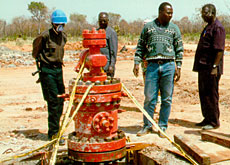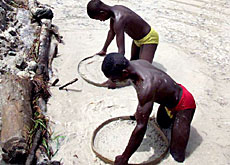Experts count the real cost of oil

Sitting on a sea of oil would seem like a blessing for a country, but in reality it often fuels civil wars, sustains corrupt regimes, and causes poverty and environmental degradation.
A recent conference in Bern considered what petroleum-importing countries like Switzerland could do to mitigate oil’s noxious effects.
“Oil represents the opportunity for real growth and poverty reduction but it has been associated with conflict and decline,” said Paul Collier, director of the centre for the study of African economies (CSAE) at Oxford University.
“The task for the international community is to help harness the opportunities of oil and curtail the ruinous disadvantages we’ve witnessed over the past 30 years.”
Money trail
Forcing corporations to declare how much money they give to governments to extract oil is seen as a vital measure in raising accountability in countries where oil revenues are squandered by the ruling elite.
“Companies need to behave transparently,” said Collier, who headed the development research group of the World Bank until April 2003.
“In the past, they’ve typically negotiated a secret deal with the president of a country, which is very advantageous for the company and the president and not for the country itself.
“That sort of behaviour wouldn’t stand a day’s scrutiny in our parliaments. We’ve got to operate in developing countries the way we operate in our own countries and the first step there is to be transparent about what the payments are.”
One effort to make corporations and governments more accountable is the UK-led Extractive Industries Transparency Initiative.
“Civil society in developing countries can use that information about revenues to start asking the awkward questions about how the money is being spent or misspent,” said Collier.
Working model
Chad is one of the poorest countries in the world with an annual per capita income of less than $250.
Under an agreement with the World Bank signed in 2000, the government of Chad committed itself to greater transparency and sound management in the use of the country’s oil revenues.
“Transparency means audits being done on public expenditures, on procurement contracts and those audits are being published,” said Gregor Binkert, the World Bank’s representative in Chad.
Chad is never going to be an oil giant but anticipated oil revenues of $100-130 million a year could double per capita income.
The World Bank’s objective is to reduce poverty by ensuring the money is spent on rural development, health and education.
However, critics say the control mechanisms to track expenditure are not functional.
“The attitude and behaviour of government is crucial,” said Soumaine Adoum, the Swissaid representative in Chad. “The World Bank doesn’t have a lot of influence over that.”
For Binkert, it is still early days. “We are just starting to build up these systems,” he told swissinfo. “The oil money is not yet there but by 2004, we will see the impact of these kind of capacity-building measures.”
Oil and ethics
Some oil companies have already stated their commitment to ethical corporate behaviour and in particular to the observance of human rights.
The Swedish oil company, Lundin, which has its main branch in Geneva, ran a number of community development projects in Sudan.
“There are certain business expenditures that one makes with the hope of eventually obtaining something in return,” explained Christine Batruch, vice president of Lundin’s corporate responsibility division.
“I would say that corporate responsibility is that form of investment. If the community is happy with our work, we work better with it and therefore we profit.”
Swiss role
Even small countries like Switzerland have a role to play – whether through diplomatic initiatives to put pressure on governments and companies or by ensuring that embezzled money is not laundered here.
“Switzerland is not a major player in the oil business and it is not possible for a small country like Switzerland to bring about changes in the ways oil is produced and marketed,” said Ivo Kaufmann, head of foreign investments and multinational enterprises at the state secretariat for economic affairs (Seco).
“However, we are challenged as a financial centre to come up with solutions when it becomes obvious that money has been embezzled and laundered, and there Switzerland certainly has undertaken substantive steps over the past few years.”
Some participants at the conference called for a labeling system so that consumers in oil-importing countries could make decisions about which oil to use, based on its country of origin.
For Rudolf Rechsteiner, university lecturer in environmental policy at Basel University and member of the Swiss parliament, the debate goes further.
“Ultimately the solution lies in reducing dependency on oil and other non-sustainable resources,” he said.
The petroleum debate was the centerpiece of this year’s annual conference of swisspeace, a peace research institute with headquarters in Bern.
swisspeace investigates the causes of wars and violent conflicts and looks at ways to resolve them.
swissinfo, Vincent Landon
Oil may produce great wealth for some but it often brings hardship and misery to the societies where it is found.
Many petroleum-rich countries are plagued by corrupt and authoritarian governments, uneven and unsustainable economic development and violent conflict.
Multinational oil corporations and consumption patterns in the North often exacerbate the problem.
Experts have been discussing ways of increasing accountability and ensuring that oil revenues fund development.

In compliance with the JTI standards
More: SWI swissinfo.ch certified by the Journalism Trust Initiative


You can find an overview of ongoing debates with our journalists here . Please join us!
If you want to start a conversation about a topic raised in this article or want to report factual errors, email us at english@swissinfo.ch.